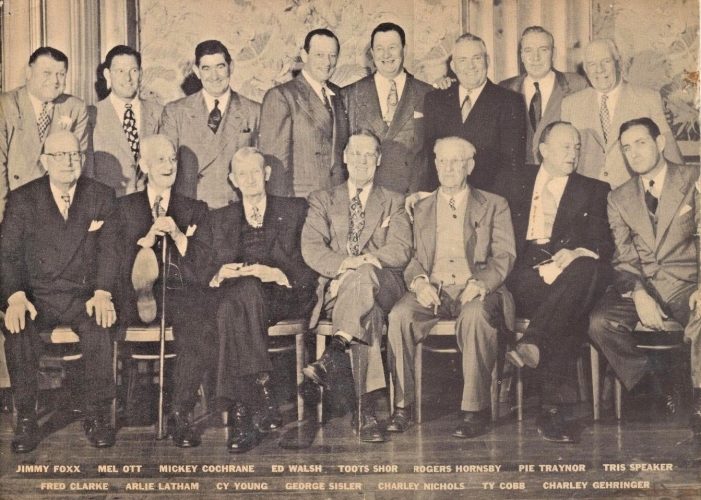In February 1951, a grand collection of baseball greats attended a party held by Toots Shor – the legendary New York City restaurateur – in celebration of the National League’s 75th anniversary. Included among the distinguished group were Hall of Famers Fred Clarke, Ty Cobb, Mickey Cochrane, Jimmie Foxx, Charlie Gehringer, Rogers Hornsby, Kid Nichols, Mel Ott, George Sisler, Tris Speaker, Pie Traynor, Ed Walsh, and Cy Young. The significance of this event can’t be overstated: One room, for a few fleeting hours, held within its walls the living embodiment of major-league history in its near entirety – a walking, talking baseball museum if you will.
The ages of the attendees ran the gamut: Arlie Latham, the 90-year-old former speed demon (742 stolen bases) whose mischievous disposition earned him a most colorful moniker – “The Freshest Man on Earth” – was born in 1860 and began his career during the National League’s infancy. On the opposite end of the spectrum was Mel Ott – baseball’s “Boy Wonder” – who at age 41 had recently become Cooperstown’s youngest inductee. With a generous medley of the game’s most memorable players, characters, and storytellers on hand to reminisce, the conversations and spirited exchanges were priceless. (The constant flow of food and drink, alcoholic and otherwise, helped to keep the proceedings lively.)
The most energetic of the revelers was Ed Walsh, the fearsome spitball specialist who won 40 games with the 1908 White Sox. “Walsh – there’s the guy who really stole the show at the big Diamond Jubilee,” wrote Francis Stann, a columnist for The Washington Evening Star. “He’ll be 70 years old come May and, standing at Shor’s oasis next to Ott, he looks as if he could be Mel’s brother.” As the evening progressed, the spry, soon-to-be septuagenarian grew increasingly animated: “Big Ed” demonstrated his impressive dance moves and performed a comedic Vaudeville-esque routine in which he rattled off – in breakneck fashion – mirthful “patter” in an Irish patois. At one point, an astonished Jimmie Foxx stopped to watch Walsh as he danced a lively jig.
“You don’t see that nowadays,” said Foxx, who was grinning ear-to-ear. “In the old days, the good ballplayer and the champion fighter were on the stage. They danced and pattered and – well, what the hell. We can’t all be hams.” The good-natured Walsh, with a big smile on his face, responded with a hearty chuckle.
Throughout the evening, players and staff went from table to table collecting autographs, with Cobb, Tris Speaker, and Cy Young being among the most popular requestees. The most enthusiastic of the autograph hounds was Walsh, though they weren’t for him. “Big Ed” – whose huge heart rivaled his tremendous physique – was making the rounds on behalf of his new friends: a group of brave youngsters he’d recently visited in a children’s polio ward. Despite being out of the limelight for decades, the Hall of Fame hurler had not been forgotten by the younger generation: Walsh, who would’ve made a fine accountant, told one reporter that he had responded to 2,676 autograph requests from kids over the past year!
An uncharacteristically subdued Ty Cobb, acting as if he hadn’t eaten in a week, sat quietly with his head down while working his way through multiple helpings of pasta and anchovies. Suddenly, as if out of the blue, “The Georgia Peach” laid down his fork and began starring at Jimmie Foxx, who was sitting several tables over. “There’s a guy,” Cobb exclaimed, “who could hit a longer ball than Babe Ruth. And I mean a ‘longer’ ball. Foxx should have set a lot more records and made a lot more money.” Cobb, an astute investor worth millions, then offered a few bits of financial advice to Foxx, whose money troubles were well-known. “It’s no use, Ty – I am a lousy businessman,” Foxx sheepishly explained. “For instance, years ago, I sold the rights to my bat model for $50.”
As the night wound down, Ed Walsh began discussing his two great passions: raising flowers – especially mums – and Joe Jackson. “Shoeless Joe,” he insists, was innocent, and deserves a plaque in Cooperstown. “He had no more to do with the Black Sox scandal in 1919 than you did,” declared Walsh, ambiguously pointing across the room. “In fact, whenever I read of an all-time outfield of Cobb, Speaker and Ruth, I know it’s wrong. One guy who ought to be in that outfield is Jackson, and I don’t care if it means dropping any one of those guys.”
Speaker, who was sitting at Walsh’s table, laughed before raising his wine glass to make a toast of sorts. “If you say so, Ed, I’ll drop out,” Speaker said earnestly. “Like you, I hope that someday baseball will air out that rap on Jackson and, believe me, I’ll gladly play on the second or third team.” Ty Cobb, who once described Jackson as “the perfect hitter,” nodded his head in agreement.



